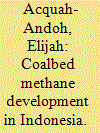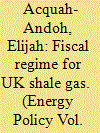| Srl | Item |
| 1 |
ID:
166730


|
|
|
|
|
| Summary/Abstract |
Due to increasing demand for natural gas in Indonesia, the Government now promotes exploration for coalbed methane (CBM). Currently, Indonesia has 453 trillion cubic feet (TCF) of CBM reserves. However, CBM development in the country is still in the exploration phase, with significant under-investment. To attract investors, a tailored Production Sharing Contracts (PSC) regime is required. Based on a combination of Factor Analysis (FA), Discounted Cash Flows (DCF) and Parameter Sensitivity Analysis, the research explores an optimal scenario of a company's share of revenue that optimised CBM development contracts. We find that a combination of 5 years straight line depreciation (SLD), 5% First Tranche Petroleum (FTP), 78% Contractor Share (CS) and 35% income tax best spreads the risk of CBM development and exploitation between the government and the contractor. This combination is a more suitable PSC regime for developing CBM in an early stage of the industry. Therefore, the Government must cede some taxes during exploration to incentivise CBM development. Three PSCs regimes are thus required to fully develop and exploit CBM, including exploration, transitional and exploitation phase PSCs which better match contractor risks and returns and ensure reasonable certainty of contractor cost recovery.
|
|
|
|
|
|
|
|
|
|
|
|
|
|
|
|
| 2 |
ID:
175257


|
|
|
|
|
| Summary/Abstract |
The UK is believed to hold prolific reserves of shale gas; the quality of which has been compared and sometimes branded superior to the much successful US shale plays. Nonetheless, after more than ten years since the 13th Onshore Licensing Round, the fracking industry is said to have benefited from just £400 million - £500 million of estimated investments and only one partially fracked well with yet an uncertain fate of commercial production. This paradox motivated the current research. Based on a discounted cash flow model, the economic feasibility of the tax regime was evaluated with a special interest in the pad allowance [PA], a major incentive of the fiscal regime. We find that the design of the fiscal regime well achieves the Government's financial objectives, but fails to support shale gas investments at lower gas prices. PA introduces further variability in investor cash flows, ultimately defeating the ethos of the incentive. We propose a reduction in the overall tax rate from 40% to no more than 21%; a removal of the additional tax charge (Supplementary Charge) and an amendment of PA rules to; (1) allow an extension of RFES to PA; (2) permit transfer of activated PA across companies in the same group; and (3) redefine capital expenditure to include intermediate well retirement costs necessary to drill new wells to stimulate production. Such a tax strategy would simplify and align the UK fiscal regime with practices across the US, China, Algeria and Canada. Importantly, it would better match the risk of shale gas investments to its rewards and could better attract investments. We recommend the strategy for emerging unconventional oil and gas producing countries for an efficient design of their fiscal regimes.
|
|
|
|
|
|
|
|
|
|
|
|
|
|
|
|